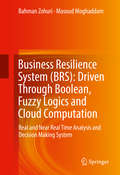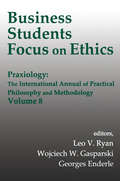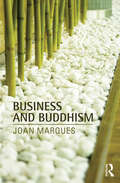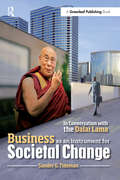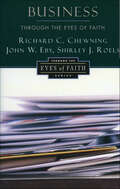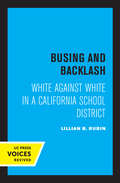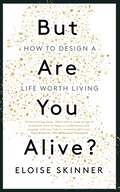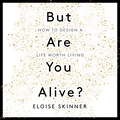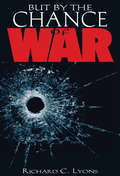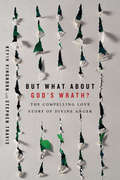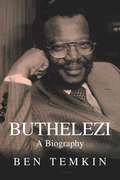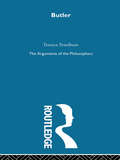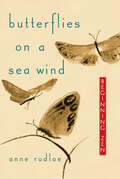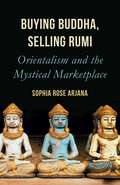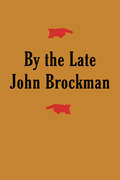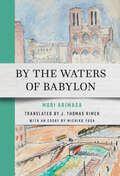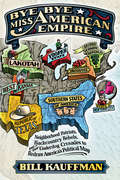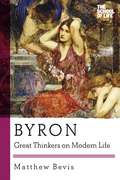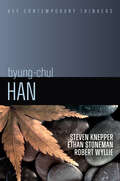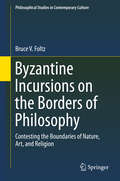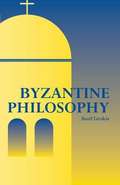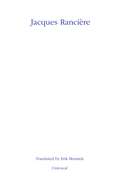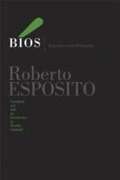- Table View
- List View
Business Resilience System (BRS) (BRS): Real and Near Real Time Analysis and Decision Making System
by Bahman Zohuri Masoud MoghaddamThis book provides a technical approach to a Business Resilience System with its Risk Atom and Processing Data Point based on fuzzy logic and cloud computation in real time. Its purpose and objectives define a clear set of expectations for Organizations and Enterprises so their network system and supply chain are totally resilient and protected against cyber-attacks, manmade threats, and natural disasters. These enterprises include financial, organizational, homeland security, and supply chain operations with multi-point manufacturing across the world. Market shares and marketing advantages are expected to result from the implementation of the system. The collected information and defined objectives form the basis to monitor and analyze the data through cloud computation, and will guarantee the success of their survivability's against any unexpected threats. This book will be useful for advanced undergraduate and graduate students in the field of computer engineering, engineers that work for manufacturing companies, business analysts in retail and e-Commerce, and those working in the defense industry, Information Security, and Information Technology.
Business Students Focus on Ethics (Praxiology: The International Annual Of Practical Philosophy And Methodology Ser. #Vol. 8)
by Wojciech W. GasparskiThe study of business ethics seeks to understand business institutions, practices and activities in light of normative behavior. The ethical concern is for the rightness or wrongness of human action. Business Students Focus on Ethics brings together essays written by twenty-five MA and MBA students from seven countries in Europe, North and South America, and the Pacific Rim. Collectively, they give us an applied business ethics framework, one with international dimensions.Business Students Focus on Ethics achieves a number of objectives: it recognizes ethics as legitimate content in graduate level studies in business world wide; seriously examines specific ethical concerns by young managers; and reflects on these concerns from across cultural and geographic borders. It also demonstrates the quality of their analysis and recommendations.The essays in this volume are arranged into four interrelated groups. The first group, "Praxiological and Ethical Framework," examines issues of human action from both the theory of human action (i.e., praxiological) and ethical dimensions. The section group of essays, "Social Issues-Compensation and Labor," discuss applications of praxiological and ethical principles in relation to the ethical responsibilities of business. The third group discusses "Ethical Issues in Health Care" from three different cultural perspectives. The fourth group is a series of "Corporate Case Studies." This volume may be seen as a companion to Volume 5 of the Praxiology series, Human Action in Business and will be of interest to business people, economists, policy makers, social scientists and students of philosophy and ethics.
Business and Buddhism
by Joan MarquesBusiness and Buddhism explores alternative ways of leading in the aftermath of the Great Recession and the many stories of fraud and greed that emerged. The book explores shifts in business perspectives as more value is placed on soft skills like emotional intelligence and listening, and introduces the reader to the principles in Buddhist philosophy that can be applied in the workplace. Buddhist practices are increasingly understood as spiritual, rather than religious per se. In fact, Buddhism is alternately referred to as a philosophy or psychology. In this book, Marques explores the value of applying the positive psychology of Buddhism to work settings. She outlines the ways in which it offers highly effective solutions to addressing important management and organizational behavior related issues, but also flags up critical areas for caution. For example, Buddhism is non-confrontational, and promotes detachment. How can business leaders negotiate these principles in light of the demands of modern day pressures? The book includes end of chapter questions to promote reflection and critical thinking, and examples of Buddhist leaders in action. It will prove a captivating read for students of organizational behavior, management, leadership, diversity and ethics, as well as business consultants.
Business as an Instrument for Societal Change: In Conversation with the Dalai Lama
by Sander TidemanBusiness as an Instrument for Societal Change: In Conversation with the Dalai Lama is the result of two decades of research and dialogue with His Holiness the Dalai Lama and other leaders in business, government, science and education. Author Sander Tideman, a lawyer and banker who has maintained a friendship with the Dalai Lama over all these years, presents a practical framework and methodology to develop a new kind of leadership - one fit to repurpose the business world and tackle escalating social, economic and environmental needs. The Dalai Lama rarely speaks directly on the topics of business, leadership and economics. Yet in the dialogues recounted here, his wisdom - combined with key insights from business and public leaders -creates a unified shift towards a consciousness of interconnectedness, offering profound insights for practitioners and general readers alike. Tideman unites the scientific worldviews of physics, neuroscience and economics with the positive psychology of human relationships, and ancient spiritual wisdom, to formulate practical business leadership solutions. While recognizing the need for change in external structures and governance, Tideman highlights the importance of opening our minds, and connecting inner and outer spirituality. At the same time, he focuses on concrete practices for winning the hearts and minds of employees, customers, communities, and society at large, while addressing deep-rooted problems such as extreme social inequality and continued financial collapses. At the heart of this book lies the journey to discover our shared purpose. This ignites new sources of value creation for the organisation, customers and society, which Tideman terms 'triple value'. We can achieve triple value by aligning societal and business needs, based on the fundamental reality of interconnection. Business as an Instrument for Societal Change: In Conversation with the Dalai Lama is a readable and intelligent exploration of how leaders can actually help to shape a sustainable global economy by embracing innate human and humane behaviour. It is also Tideman's fascinating personal journey, which brought him to question the underlying motivations and goals of business leadership and to seek a new paradigm for a more sustainable approach. Reflecting Tideman's sharp perceptions and infused with the Dalai Lama's unmistakable joy, this book has the power to change your way of thinking.
Business through the Eyes of Faith (Through the Eyes of Faith)
by Richard C. Chewning John W. Eby Shirley J. RoelsIs capitalism Christian? Is there a Christian perspective on business? How should a Christian use power in the workplace? In addressing such difficult questions as these, Business Through the Eyes of Faith demonstrates how God can dwell at the center of one's life even in the secular marketplace.Here is pragmatic affirmation of the role that committed Christians can play in the business world. The authors stress the connections between Christian principles and good management and provide biblical passages that support their principles and relate them to the practical issues faced by Christian managers. Issues such as employee motivation, workplace communication, business leadership, the role of profit, and social responsibility are all addressed in concrete terms and reinforced by short vignettes, suggested biblical passages to explore, and commentaries from contemporary theorists and practitioners.Business Through the Eyes of Faith shows that business can and should be a reflection of God's kingdom. It is an invaluable resource for Christian business students, managers, and those who wish to understand the concerns and motives of Christians in the business world.
Busing and Backlash: White against White in a California School District
by Lillian B. RubinThis title is part of UC Press's Voices Revived program, which commemorates University of California Press’s mission to seek out and cultivate the brightest minds and give them voice, reach, and impact. Drawing on a backlist dating to 1893, Voices Revived makes high-quality, peer-reviewed scholarship accessible once again using print-on-demand technology. This title was originally published in 1972.
But Are You Alive?: How to Design a Life Worth Living
by Eloise Skinner"A beautiful, sensitive book about the most important issues we face in life." -Emily Esfahani Smith, author of The Power of MeaningIn 'But Are You Alive?', entrepreneur and teacher Eloise Skinner explores lessons learned from a decade spent pursuing depth, purpose and meaning, including from her training in a monastic community and in the field of existential therapy. Working through practical exercises, principles and tools, Eloise shares wisdom and actionable advice from a variety of traditions and perspectives, all with the intention of helping the reader find a sense of deeper 'aliveness' in daily life.
But Are You Alive?: How to Design a Life Worth Living
by Eloise Skinner"A beautiful, sensitive book about the most important issues we face in life." -Emily Esfahani Smith, author of The Power of MeaningIn 'But Are You Alive?', entrepreneur and teacher Eloise Skinner explores lessons learned from a decade spent pursuing depth, purpose and meaning, including from her training in a monastic community and in the field of existential therapy. Working through practical exercises, principles and tools, Eloise shares wisdom and actionable advice from a variety of traditions and perspectives, all with the intention of helping the reader find a sense of deeper 'aliveness' in daily life.
But Are You Alive?: How to Design a Life Worth Living
by Eloise SkinnerDiscover your path to a varied and meaningful life, and feel truly alive.In 'But Are You Alive?', entrepreneur and teacher Eloise Skinner explores lessons learned from a decade spent pursuing depth, purpose and meaning, including from her training in a monastic community and in the field of existential therapy. Working through practical exercises, principles and tools, Eloise shares wisdom and actionable advice from a variety of traditions and perspectives, all with the intention of helping listeners find a sense of deeper 'aliveness' in daily life.(P)2022 Hodder & Stoughton Limited
But By the Chance of War
by Richard C. LyonsBut By the Chance of War is a poetical and historical work, examining humanity's impulses for and reactions to war in various historical settings. It treats matters common to all conflicts and matters unique, given mankind's technological advances.
But What About God's Wrath?: The Compelling Love Story of Divine Anger
by Kevin KinghornHow can a loving God also be a God of wrath?canjustlovingBut What About God's Wrath?
Buthelezi: A Biography
by Ben TemkinBen Temkin, Buthelezi's biographer, had the full co-operation of Chief Buthelezi in the writing of this book. There were interviews and discussions in KwaZulu and in Johannesburg, in offices, at the airport, in hotels, in private homes and even while they travelled between centres in KwaZulu.
Butler-Arg Philosophers (Arguments Of The Philosophers Ser.)
by Terence PenelhumFirst Published in 1999. Routledge is an imprint of Taylor & Francis, an informa company.
Butterflies on a Sea Wind: Beginning Zen
by Anne RudloeThis memoir by a marine biologist &“sings the life of a beginning Zen practitioner. . . . [with] a haunting, beautiful appreciation of the natural world.&”(Publishers Weekly) Anne Rudloe was attracted to Zen as a college student. But it seemed premature for a twenty-one-year-old to focus on the difficulties of life when she'd hardly begun to live. Twenty-five years later, she was ready to explore the spiritual discipline that originated in Asian monasteries more than a millennium ago. Rudloe's quest is compellingly chronicled in Butterflies on a Sea Wind, which combines the rigor of formal monastic Zen practice with the challenges of integrating Zen concepts into modern daily life. Her narrative describes both the physical and mental demands of Zen retreats and how she applied what she learned there to her work as a marine biologist in Florida, as well as to the rigors of raising children and caring for an elderly grandmother. In words that intimately draw in her readers, she describes how Zen helps us look inward and use the wisdom we find there to reach out to others. During the 1990s, the number of organized Buddhist centers in this country grew more than 40 percent, from 429 to 1,062. While there are many books about Zen on the market today, few give a clear picture of what it's like to actually sit down and begin a meditation practice and then apply it to a daily life. Likewise, few books discuss the types of issues most people face every day: raising a family and earning a living. Butterflies on a Sea Wind does all this and more.
Butterflies on a Sea Wind: Beginning Zen
by Anne RudloeThis memoir by a marine biologist &“sings the life of a beginning Zen practitioner. . . . [with] a haunting, beautiful appreciation of the natural world.&”(Publishers Weekly) Anne Rudloe was attracted to Zen as a college student. But it seemed premature for a twenty-one-year-old to focus on the difficulties of life when she'd hardly begun to live. Twenty-five years later, she was ready to explore the spiritual discipline that originated in Asian monasteries more than a millennium ago. Rudloe's quest is compellingly chronicled in Butterflies on a Sea Wind, which combines the rigor of formal monastic Zen practice with the challenges of integrating Zen concepts into modern daily life. Her narrative describes both the physical and mental demands of Zen retreats and how she applied what she learned there to her work as a marine biologist in Florida, as well as to the rigors of raising children and caring for an elderly grandmother. In words that intimately draw in her readers, she describes how Zen helps us look inward and use the wisdom we find there to reach out to others. During the 1990s, the number of organized Buddhist centers in this country grew more than 40 percent, from 429 to 1,062. While there are many books about Zen on the market today, few give a clear picture of what it's like to actually sit down and begin a meditation practice and then apply it to a daily life. Likewise, few books discuss the types of issues most people face every day: raising a family and earning a living. Butterflies on a Sea Wind does all this and more.
Buying Buddha, Selling Rumi: Orientalism and the Mystical Marketplace
by Sophia Rose ArjanaFrom jewellery to meditation pillows to tourist retreats, religious traditions – especially those of the East – are being commodified as never before. Imitated and rebranded as &‘New Age&’ or &‘spiritual&’, they are marketed to secular Westerners as an answer to suffering in the modern world, the &‘mystical&’ and &‘exotic&’ East promising a path to enlightenment and inner peace. In Buying Buddha, Selling Rumi, Sophia Rose Arjana examines the appropriation and sale of Buddhism, Hinduism and Islam in the West today, the role of mysticism and Orientalism in the religious marketplace, and how the commodification of religion impacts people&’s lives.
By the Late John Brockman
by Mr John BrockmanA radical, experimental work that challenges the boundaries of poetry, philosophy, and science. First published in 1969, this new and expanded edition of John Brockman's first book, By The Late John Brockman, also includes the full text of 37 (1971), and Afterwords (1973).This edition features a new foreword by Hans Ulrich Obrist, co-director of the Serpentine Gallery and author of Ways of Curating.
By the Waters of Babylon
by Arimasa MoriBy the Waters of Babylon is a memoir and travelogue by Mori Arimasa, the influential Japanese philosopher and intellectual who interpreted European culture to postwar Japan. A professor of French philosophy, Mori visited Paris and came to the realization that to truly understand the significance of French and European civilization, he would have to live there and immerse himself in French culture. Abandoning his Tokyo professorship, Mori remained in France for over two decades, teaching, translating, and writing. Written in an intimate epistolary style, Mori's memoir chronicles his complex response as an outsider to a culture he so admired. His observations on European art, architecture, literature, and philosophy were highly influential to the first Japanese generation to come of age after World War II, who felt a need for Japan to rejoin the global community. By the Waters of Babylon is a compelling account of cross-cultural encounters and a meditation on living and loving a culture that is so different from one's own.
Bye Bye, Miss American Empire
by Bill KauffmanIt's been almost a century and a half since a critical mass of Americans believed that secession was an American birthright. But breakaway movements large and small are rising up across the nation. From Vermont to Alaska, activists driven by all manner of motives want to form new states-and even new nations. So, just what's happening out there? The American Empire is dying, says Bill Kauffman in this incisive, eye-opening investigation into modern-day secession-the next radical idea poised to enter mainstream discourse. And those rising up to topple that empire are a surprising mix of conservatives, liberals, regionalists, and independents who-from movement to movement-may share few political beliefs but who have one thing in common: a sense that our nation has grown too large, and too powerfully centralized, to stay true to its founding principles. Bye Bye, Miss American Empiretraces the historical roots of the secessionist spirit, and introduces us to the often radical, sometimes quixotic, and highly charged movements that want to decentralize and re-localize power. During the George W. Bush administration, frustrated liberals talked secession back to within hailing distance of the margins of national debate, a place it had not occupied since 1861. Now, secessionist voices on the left and right and everywhere in between are amplifying. Writes Kauffman, "The noise is the sweet hum of revolution, of subjects learning how to be citizens, of people shaking off . . . their Wall Street and Pentagon overlords and taking charge of their lives once more. " Engaging, illuminating, even sometimes troubling,Bye Bye, Miss American Empireis a must-read for those taking the pulse of the nation.
Byron: Great Thinkers on Modern Life
by Matthew BevisLord Byron is one of the most provocative and seductive voices of world literature, and Matthew Bevis provides insights from his work that resonate even today. Born in 1788, Lord Byron was an English poet and a leading figure of the Romantic movement. A prodigious poetic gift and a scandalous private life made him famous throughout Europe, and his masterpiece, Don Juan, became the bestselling work of the period. He remains one of the most storied and fascinating figures in world literature, and Matthew Bevis takes this great thinker and highlights the ideas most relevant to us today. The Great Thinkers on Modern Life Series, part of The School of Life, shows how thse wise voices from the past have urgently important and inspiring things to tell us.
Byung-Chul Han: A Critical Introduction (Key Contemporary Thinkers)
by Steven Knepper Ethan Stoneman Robert WyllieByung-Chul Han is one of the most important living philosophers, renowned for his critiques of the digital age. In response to the idea that new technological devices expand our freedom, he argues that they lead to burnout and self-absorption and that we must redevelop contemplative practices which slow us down and open us up. He has brought to his thought forms of deep cosmopolitanism developed from both Zen Buddhism and a renewed Romanticism. This book is the first critical introduction to Han’s body of work. Knepper, Stoneman, and Wyllie explore Han’s rich oeuvre to date and his incisive contributions to a range of disciplines, including critical theory, media studies, political philosophy, and aesthetics. They unpack his key terms and illustrate his concepts with a range of examples, revealing how the critiques of the “achievement society” and burnout, which have earned Han a global audience, build on his earlier accounts of power, violence, and mood. This broader view addresses the most frequent criticisms of Han and makes a compelling case that he is not only an insightful diagnostician of the present moment but one whose interpretation of both Western and Eastern traditions offers wisdom for navigating the now acute problems of modernity. This lively book is essential reading for anyone getting to grips with Han’s extraordinary work.
Byzantine Incursions on the Borders of Philosophy: Contesting the Boundaries of Nature, Art, and Religion (Philosophical Studies in Contemporary Culture #26)
by Bruce V. FoltzThis book represents a series of incursions or philosophical forays between realms of Byzantine and Russian thought and territory long claimed by Western philosophy and theology. Beginning with thoughts inevitably rooted in the West, it seeks to penetrate as deeply as possible into Byzantine and Russian philosophical and spiritual landscapes, and to return with fresh insights. These are also incursions that move back and forth between the visible and the invisible realms, in the traditions of Plato and his successors as well as the great monastics of Eastern Christianity. Foltz argues from various perspectives that the problematic relation between transcendence and immanence finds its answer in the philosophical and theological legacy of Eastern Christian thought, which has always sought to bring together strands tenaciously held separate in the West. This book transports contemporary readers to an ancient conceptual landscape as it expertly handles both Western and Byzantine ideas with a familiarity unusual to contemporary scholars. It is essential reading for all those wishing to engage the heart of Byzantine thought and employ its lessons to address the problems which plague Western philosophy and culture.
Byzantine Philosophy
by Basil Tatakis Nicholas J. MoutafakisWestern studies tend to view Byzantine philosophy either as a minor offshoot of western European thought, or a handy storehouse for documents and ideas until they are needed. A scholar of philosophy (Aristotle U. of Thessaloniki), Tatakis (1896-1996) finds the view limiting, pointing out that during the Roman period, few Greeks learned Latin but Romans were not considered educated without a founding in Greek, and that Byzantine Christianity has its own trajectory unconcerned with how it deviates from western orthodoxy.
Béla Tarr, the Time After (Univocal)
by Jacques RancièreFrom Almanac of Fall (1984) to The Turin Horse (2011), renowned Hungarian filmmaker Béla Tarr has followed the collapse of the communist promise. The &“time after&” is not the uniform and morose time of those who no longer believe in anything. It is the time when we are less interested in histories and their successes or failures than we are in the delicate fabric of time from which they are carved. It is the time of pure material events against which belief will be measured for as long as life will sustain it.
Bíos: Biopolitics and Philosophy
by Roberto Esposito Timothy CampbellRoberto Esposito is one of the most prolific and important exponents of contemporary Italian political theory. B#65533;os-his first book to be translated into English-builds on two decades of highly regarded thought, including his thesis that the modern individual-with all of its civil and political rights as well as its moral powers-is an attempt to attain immunity from the contagion of the extraindividual, namely, the community. In B#65533;os, Esposito applies such a paradigm of immunization to the analysis of the radical transformation of the political into biopolitics. B#65533;os discusses the origins and meanings of biopolitical discourse, demonstrates why none of the categories of modern political thought is useful for completely grasping the essence of biopolitics, and reconstructs the negative biopolitical core of Nazism. Esposito suggests that the best contemporary response to the current deadly version of biopolitics is to understand what could make up the elements of a positive biopolitics-a politics of life rather than a politics of mastery and negation of life. In his introduction, Timothy Campbell situates Esposito's arguments within American and European thinking on biopolitics. A comprehensive, illuminating, and highly original treatment of a critically important topic, B#65533;os introduces an English-reading public to a philosophy that will critically impact such wide-ranging current debates as stem cell research, euthanasia, and the war on terrorism. Roberto Esposito teaches contemporary philosophy at the Italian Institute for the Human Sciences in Naples. His books include Categorie dell impolitico, Nove pensieri sulla politica, Communitas: orgine e destino della comunit#65533;, and Immunitas: protezione e negazione della vita. Timothy Campbell is associate professor of Italian studies in the Department of Romance Studies at Cornell University and the author of Wireless Writing in the Age of Marconi (Minnesota, 2006).
